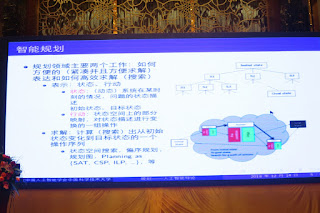The 2nd
Nation Higher Education Teacher Training Course for “Introduction of Artificial
Intelligence” (第二期全国高校《人工智能导论》师资培训班) was organized by CAAI from 14th
to 16th Dec 2018 in Fuzhou.
In Day 3, I met Prof. Ma Shaoping (马少平) (清华大学计算机系教授、博士生导师; 中国人工智能学会副理事长) and took a photo for memory. He told me that he had visited Department of
Computer Science, CityU many years ago.
Day 3 (20181216):
Prof. Ma
Shaoping (马少平) was the first speaker in the Day 3 and his topic named “Search Technology”
(搜索技术). Search problem included space and path.
Then Prof.
Ma introduced different search algorithms. Blind search (盲目搜索) included Depth First Search
(DFS) (深度优先搜索) and Width
First Search (WFS) (宽度优先搜索). DFS was not guarantee to find the optimal solution if the depth limit
was wrong. WFS should find the solution
if it had but resource consumption was high (see following diagram).
And then
Prof. Ma mentioned the Heuristic Algorithm (启发式算法) which also called A Searching
Algorithm (A算法). If A Searching Algorithm fulfilled heuristic function - h(n) <=
h*(n), it became A* (A Start) Searching Algorithm which usually used for the
process of finding a path between multiple points, called "nodes".
After
that he stated Alpha–beta pruning (α-ꞵ剪枝) which employed for chess game (except GO)
that seek to decrease the number of nodes and evaluated by the minimax
algorithm in its search tree.
Finally, Prof. Ma Shaoping introduced Monte Carlo Tree Search (MCTS) (蒙地卡罗树搜寻) which had four steps and they were Selection, Expansion, Simulation and Backpropagation.
The
second topic presented by Prof. Ma Shaoping was “Expert System” (专业系统). Expert system is rule-based system that emulates
the decision-making ability of a human expert.
Then
Prof. Ma briefed the general structure of expert system including human-machine
interface, translator, dynamic database, logic machine, knowledge database and
knowledge engineering for collecting knowledge.
After
that Prof. Ma using some examples to demonstrate how expert system operated.
(Remark:
My Applied Physics Degree’s final year project was to design expert system
named “Implementation of Design Cases in a Material Selection Expert System” which
had finished in April 1994.)
The
second speaker was Prof. Bao Jie (鲍捷) (文因互联 CEO、联合创始人) and his presentation topic was “Introduction
to Knowledge Graph” (知识图谱入门). Originally, Knowledge Graph is
a knowledge base used by Google and its services to enhance its search engine's
results with semantic-search information gathered from a wide variety of
sources in 2012.
Knowledge Graphs combine characteristics of several data management paradigms. It included knowledge extraction, knowledge performance and logic, knowledge storage and knowledge searching.
Then
Prof. Bao briefed the milestone of Knowledge Graphs since 1960s.
Lastly,
Prof. Bao mentioned that one of application of Knowledge Graphs was in Chabot.
After
the break, Prof. Liao Luchao (廖律超) and I took a photo with Prof. Ji Jianmin (吉建民) for memory.
Prof. Ji Jianmin (吉建民) (中国科学技术大学计算机科学与技术学院副教授) was the last speaker and his
topic presented was “Planning in Artificial Intelligence” (规划 - 人工智能导论). Planning is decision making about the actions
to be taken.
He said
that Automatic Planning started since 60s which was one of important areas in
AI. It included Classical Planning,
Neoclassical Planning and Planning under Uncertainty. After that he introduced the Intelligent Planning
which involved status and action.
Finally, he mentioned Markov decision process (MDP) (马可夫决策过程) which provided a mathematical framework for modeling decision making in situations where outcomes are partly random and partly under the control of a decision maker. Moreover, he also stated Partially Observable Markov decision process (POMDP) (部分可观察马可夫决策过程). MDP had observation and reward between World and Agent. Where POMDP had “Belief State Estimator” inside Agent.
The last
topic Prof. Liao Luchao presented was “Intelligent Robot” (智能机器人). Firstly he introduced RoboCup@Home which
aimed to develop service and assistive robot technology with high relevance for
future personal domestic applications.
Then he demonstrated different version of service robot.
After
that he briefed the Service Robot System Framework. The Task Planning was key element in the
whole system. Robot System was very
complex and integrated different knowledge in AI and Mechanical Control.
Another
important element was Natural Language Processing (自然语言处理) that could communicate between
human and robot.
The
beautiful Chinese robot named “佳佳”.
Finished
3 days training, we left Yongtai and back to Fuzhou for dinner.
Prof.
Lin Chang (林暢) (Chairman, Macau Quality Management Association (MQMA); Professor,
School of Social Development and Public Policy, Beijing Normal University) invited
Prof. Liao Luchao (廖律超) (中国科学技术大学计算机科学与技术学院副教授) and I to have dinner in Fuzhou and we took
a photo for memory.
The
seafood treatment was very special that was stream and the bottom was Porridge (粥).
In next
day Morning, I left Fuzhou and back to Hong Kong through High Speed Rail.
Only one High Speed Rail per day from Fuzhou to Hong Kong or Hong Kong to Fuzhou.
I
observed the average speed was at 207 km/h.
High
Speed Rail provided Catering Service (Rice Box / Noodle).
Reference:
20181216: 第二期全国高校《人工智能导论》师资培训班成功举办
20181214: 第二期全国高校《人工智能导论》师资培训班) (Day 1) - https://qualityalchemist.blogspot.com/2018/12/the-2nd-nation-higher-education-teacher.html
20181215: 第二期全国高校《人工智能导论》师资培训班) (Day 2) - https://qualityalchemist.blogspot.com/2018/12/the-2nd-nation-higher-education-teacher_15.html
20181216: 第二期全国高校《人工智能导论》师资培训班) (Day 3) - https://qualityalchemist.blogspot.com/2018/12/the-2nd-nation-higher-education-teacher_16.html




























沒有留言:
發佈留言